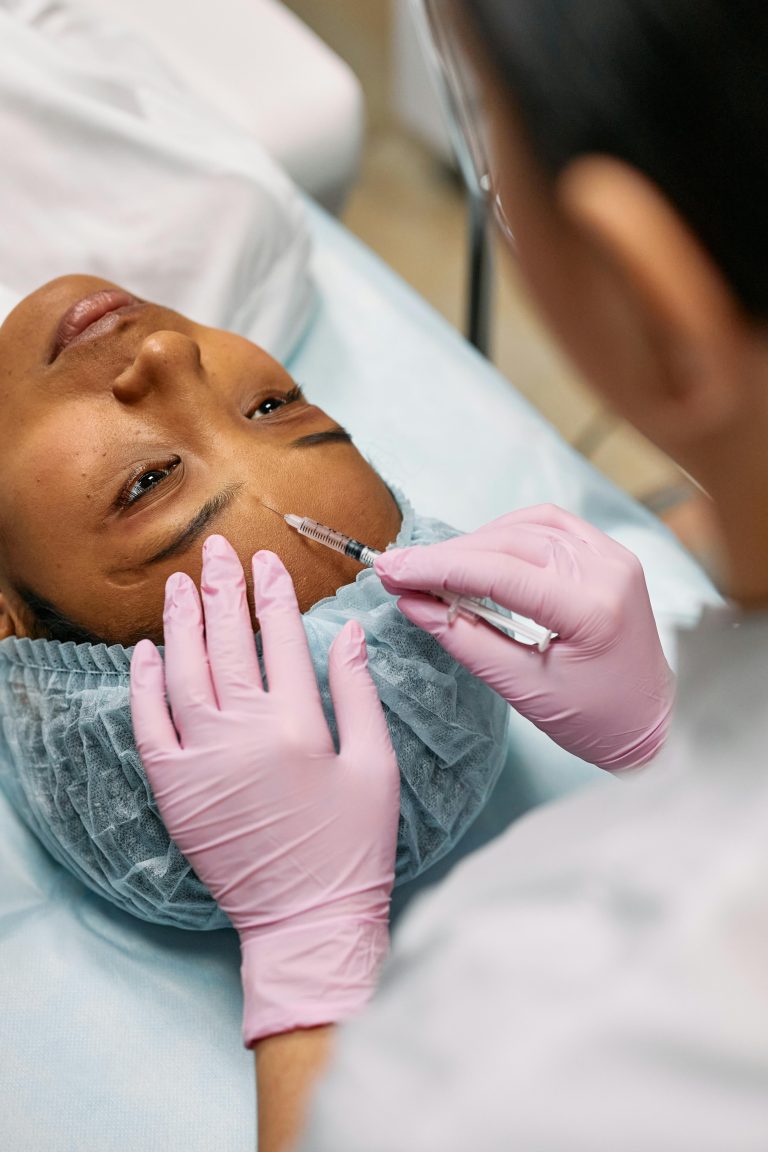Let’s be real, hyperpigmentation is like that one uninvited guest who just won’t leave the party! While melanin gives black skin its beautiful, rich colour, it also means that the skin is more susceptible to pigmentation issues, such as dark spots and an uneven skin tone (cue: a seemingly never-ending cycle of expensive skincare products and treatments). If you’re struggling with hyperpigmentation, join the club. While there is no guarantee that you can banish these pesky marks forever, the good news is that there are proven and effective ways to fade hyperpigmentation on black skin. Understanding hyperpigmentation, its causes, and the best treatment methods, can empower you to care for your skin effectively and confidently.
So, don’t worry, we’ve got your back with everything you need to know to tackle hyperpigmentation head-on. We’ll break down what causes hyperpigmentation, how to prevent it, and which products can help you achieve that smooth, even-toned skin we all deserve. Grab a cup of tea, relax, and let’s dive into the journey to flawless skin!
What is hyperpigmentation?
Hyperpigmentation is the term used to describe darker patches of skin caused by excess melanin production. Hyperpigmentation on black skin in particular, is caused by an over production of melanin. Melanin is the pigment responsible for skin, hair, and eye colour. This condition can affect all skin types, but it’s especially visible on black skin. Technically, our bodies are always working to protect us, and when our melanin goes overdrive, this is one of those protective measures. Although this is a natural response, sometimes it can get a little overzealous. Bottom line, it’s not fun. But, before we present you with a bunch of magic solutions to transcend your skincare journey, let’s dive into the causes of hyperpigmentation:
Common causes of hyperpigmentation on black skin
1. Post-inflammatory hyperpigmentation (PIH)
This is one of the most prevalent causes of hyperpigmentation on black skin. It’s typically the result of an injury or inflammation to the skin, such as acne, eczema, or a cut. Even shaving or tweezing hairs can irritate the skin and cause PIH. When the skin heals, it may leave behind dark marks or patches due to an overproduction of melanin during the healing process.
2. Sun exposure
Although melanin provides some natural protection from the sun, UV rays can still trigger hyperpigmentation on black skin. Overexposure to the sun can darken existing spots and cause new areas of hyperpigmentation to form. Plus, skincare products containing active ingredients such as alpha-hydroxy-acids (AHA’s) and retinols can increase your skin’s sensitivity to the sun. For these reasons, a separate sun protection product in your routine is NON-negotiable!
3. Hormonal changes
Hormonal fluctuations, particularly during pregnancy or while taking birth control, can lead to melasma — a form of hyperpigmentation characterized by dark, blotchy patches on the face. Melasma is typically influenced by a combination of hormones and sun exposure, making it more common amongst black women.
4. Irritation from skincare products
Harsh skincare products that contain strong acids or fragrances can irritate sensitive skin and lead to hyperpigmentation. It’s important to choose products formulated with black skin in mind, free from inflammatory ingredients, and cater to your skin type.
How to prevent and treat hyperpigmentation
Now that we understand what hyperpigmentation is and why it happens, let’s explore the best treatments. Treating hyperpigmentation on black skin requires a careful and targeted approach that addresses excess melanin production while preserving the skin’s natural tone. As frustrating as hyperpigmentation is, the important thing to remember is that it is treatable. Incorporating one of these tips just won’t cut it. We strongly recommend that you attempt a multi-faceted approach, for an extended period of time, particularly on older hyperpigmentation. Here are some tips and product recommendations to nudge you along your journey:
1. Sunscreen is essential
One of the most crucial steps in preventing and treating hyperpigmentation is the consistent use of sunscreen. All skin types will benefit from using sunscreen, but on black skin, UV rays can worsen hyperpigmentation and slow the healing process. Look for a broad-spectrum sunscreen with an SPF of at least 30, and apply it daily — yes, even if you’re indoors or the weather is cloudy. Ultra MD’s UV Clear Facial Sunscreen is perfect for black skin as it leaves no white cast and is formulated to reduce the appearance of blemishes and discoloration.
“One of the biggest and most common misconceptions I hear when treating hyperpigmentation is that you don’t need sunscreen. Sunscreen is extremely important in protecting the skin from harmful UVA/UVB rays and also for helping prevent future hyperpigmentation while healing past discoloration.”
Dr. Caroline Robinson of Tone Dermatology for Essence
2. Incorporate gentle exfoliation
Exfoliation helps to remove dead skin cells and encourage cell turnover, which can then help to fade hyperpigmentation over time. Alpha-hydroxy-acids are one of the best ways to do this because they dissolve the bonds between dead skin cells to reveal fresher, clearer skin underneath. Opt for gentle AHA’s such as lactic acid as it does not disrupt the skins pH, or mandelic acid as its larger molecular structure means slower absorption and in turn, less irritation. The Paula’s Choice 6% Mandelic Acid + 2% Lactic Acid Liquid Exfoliant is a great place to start as its low percentage of acids is gentler on the skin. Avoid physical exfoliants with harsh scrubs as they can be too abrasive and cause trauma to the skin, worsening hyperpigmentation.
3. Retinoids
Retinoids are derivatives of Vitamin A and work to speed up cell turnover. This means that they help push older skin cells to the surface so they can be replaced by fresh, new ones. Sachi Skin’s Ursolic Acid & Retinal Overnight Reform is formulated for melanated skin and utilizes encapsulated retinaldehyde for minimal irritation. It addresses an uneven skin tone, hyperpigmentation, and texture issues.
4. Tyrosinase inhibitors aka. nature’s powerhouses
Tyrosinase is an enzyme that is utilized in the production (and over-production) of melanin. Ingredients that inhibit this production can – you guessed it — fade hyperpigmentation. Incorporating these ingredients into your skincare routine can help reduce the appearance of dark spots. Look for products containing ingredients like:
- Azelaic acid: This alpha-hydroxy-acid is hailed for its effects on hyperpigmentation, as well as rosacea. It gently targets hyperactive and abnormal melanocytes, while leaving normal and healthy cells unaffected. It also possesses strong anti-bacterial and anti-inflammatory properties. This means fewer side effects, making it a great choice for black skin that is typically reactive.
- Kojic acid: Naturally derived from fungi, it’s one of the most well-researched tyrosinase inhibitors out there. Due to this, it can be found in lotions, face/body washes, and soaps.
- Alpha arbutin: Structurally similar to the stronger, but controversial and widely banned hydroquinone, alpha arbutin works to slowly treat and prevent hyperpigmentation. It also provides some anti-oxidant support.
- Licuorice extract: This ingredient is popular in the Korean beauty market for a reason. It brightens, soothes, and calms the skin, all at once!
If you don’t know where to start, and can’t choose one ingredient to test first – you don’t have to. Hue’s Supra-Fade Dark Spot Night Serum features them all! Made for black and brown skin to target hyperpigmentation directly, this serum is gentle enough for nightly use.
5. Moisturize and protect your skin barrier
Your skin barrier is the outermost layer of your skin and works to keep environmental stressors and irritants at bay. When this is compromised, a whole host of issues arise. Keeping your skin hydrated and healthy is essential, especially if you’re dealing with hyperpigmentation. And if hyperpigmentation is a reoccurring issue for you, chances are your skin is easily irritated and sensitive. Dr Sam’s Flawless Moisturiser Intense heals and protects sensitive skin that is in need of some much needed tlc. It’s thick enough to provide adequate protection without clogging your pores.
PRO TIP!
Seek professional treatments: If over-the-counter products aren’t giving you the results you desire, consider consulting with a dermatologist. Professional treatments such as chemical peels, microdermabrasion, or laser therapy can be effective for more severe hyperpigmentation. However, it’s important to work with a dermatologist experienced in treating black skin as certain treatments can interfere with our melanin.
Embrace your skin’s journey
Dealing with hyperpigmentation can be a long process, but it’s important to be patient and gentle with your skin. Our skin renews itself in cycles, and one cycle typically takes 30-50 days depending on factors such as our diet, lifestyle, and genetics. Fading hyperpigmentation may require multiple cycles, so consistency is key. With the right products, routines, and care, you can see significant improvements.
Remember, your skin’s journey is unique to you, and taking steps to care for it is an act of self-love. While hyperpigmentation may be a common concern, it doesn’t define your beauty. Be patient with your treatments and always consult a dermatologist if you’re unsure about anything. Your melanin is magical, and it deserves to be celebrated. With a little consistency and the right routine, you’ll be saying goodbye to hyperpigmentation and hello to glowing skin!



